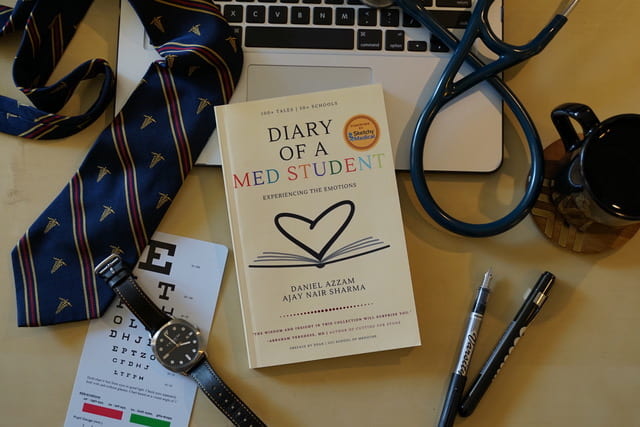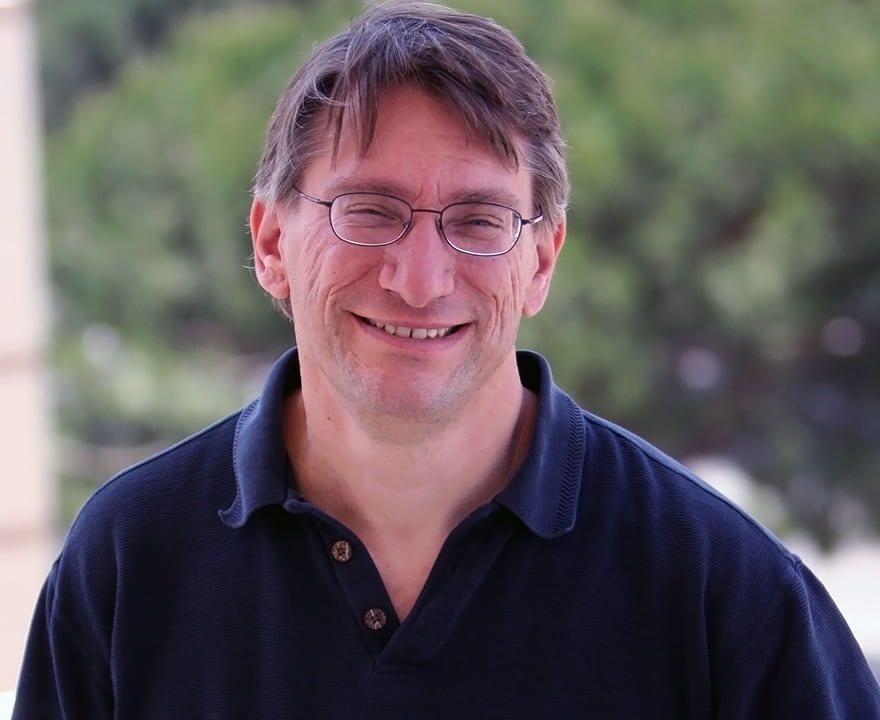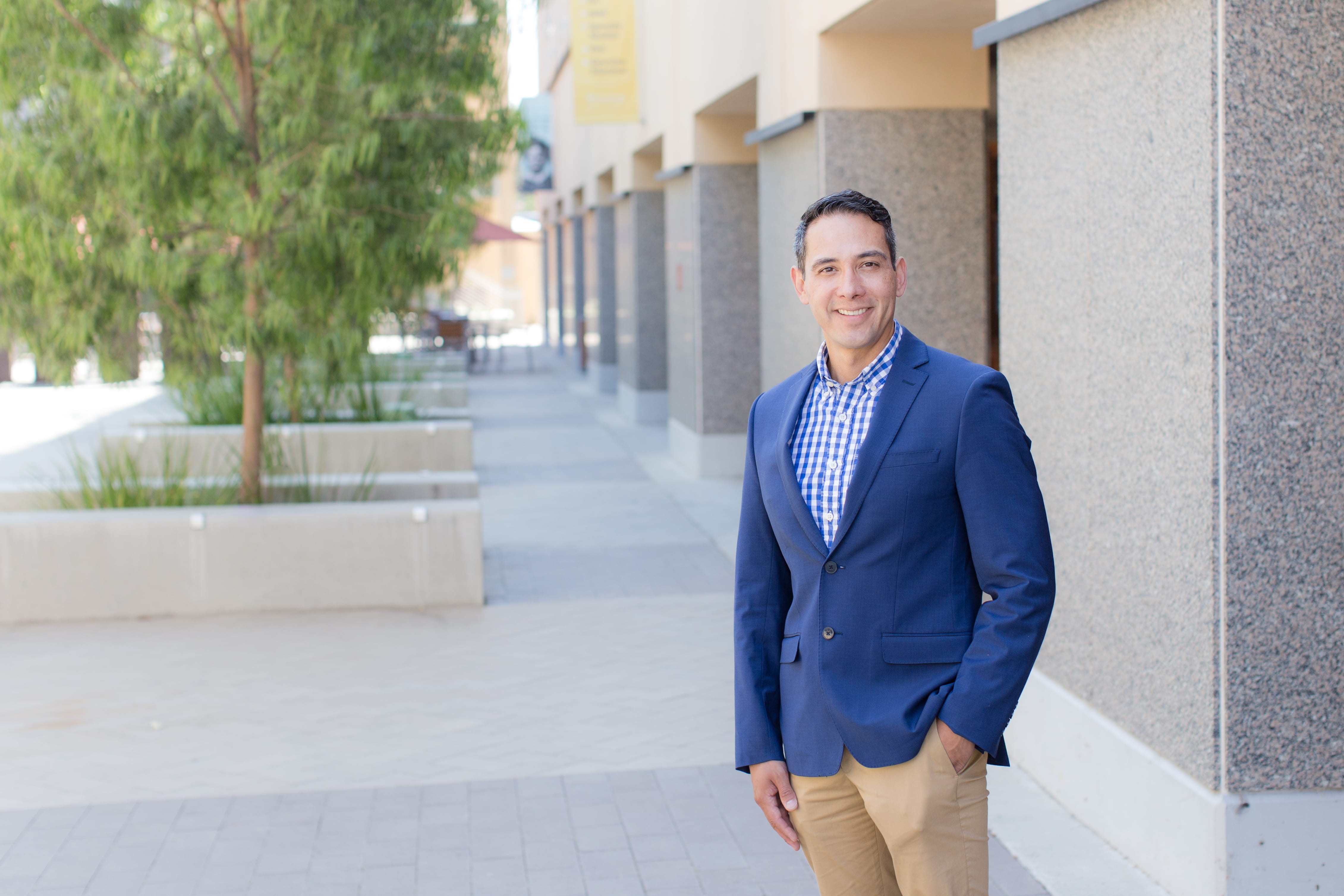UCI Podcast: Diary of a med student
UCI medical students publish a book of experiences from across country to show peers they’re not alone

Burnout and stress have been on the rise among medical students for years, and the COVID-19 pandemic has only made things worse. Helping their fellow medical students cope inspired UCI’s Ajay Nair Sharma and Daniel Azzam to publish Diary of a Med Student, a book that collects experiences from 100+ students from over 50 medical schools across the country. Some are heart-wrenching, some uplifting, and some good for a chuckle, but all stories paint a picture of what life is like in medical school today.
“We wanted to address rising burnout and the importance of mental health in medicine by creating a safe space for inner reflection and expressing emotions,” Azzam says. “This is especially important this year with the historic occurrence of the COVID-19 pandemic and the rising social injustice in today’s world.”
Learn more about the book, and read an excerpt.
In this episode:
Daniel Azzam, UCI medical student and editor-in-chief
Ajay Nair Sharma, UCI medical student and editor-in-chief
To get the latest episodes of the UCI Podcast delivered automatically, subscribe at:
Apple Podcasts – Google Podcasts – Stitcher – Spotify
Transcript
NICOLE FELDMAN, HOST
Burnout is a huge problem for medical students in the United States with up to 30% experiencing depression. During the pandemic, this is even more important than usual. One of the ways students can work through the tough times is to talk to others who are going through the same thing and having their friends and family understand what they’re going through. UCI medical students Ajay Nair Sharma and Daniel Azzam have made this a lot easier with Diary of a Med Student, a book of stories collected from medical students across the country.
From the University of California, Irvine, I’m Nicole Feldman, and you’re listening to the UCI podcast.
Ajay, Daniel, thanks so much for joining me today.
DANIEL AZZAM
Thanks for having us, Nicole.
FELDMAN
All right, so first, let’s hear about this book. Tell us what it’s about.
AZZAM
Yeah, absolutely. So our book is called Diary of a Med Student. And Diary of a Med Student is a book created by med students for med students, doctors, pre-med students and their loved ones to look backward, forward, and laterally on the wonderful world that is medical school. This book offers us a space to reflect on our emotions, process their meaning and share them as tales of joy, sorrow or humor told from the perspective of medical students writing in a diary. The context of the book, like Nicole was mentioning, is rising burnout and the importance of mental health in medicine in today’s world. And this is especially an important context this year with the historic occurrence of the COVID-19 pandemic and the rising social injustice going on in today’s world.
So far, we received over 200 submissions from over 50 medical schools, and some of the most common themes that med students of today’s world are writing about in our book are things like imposter syndrome, inequality and social injustice, the challenges of COVID-19, stresses of exams and being evaluated while we’re working in the hospital, and also just kind of looking at work-life balance and the human side of our lives outside of the hospital.
And just recently in our first month, we reached 1,000 copies sold. And one of the things that we’re most excited about right now is that we’re dedicating 100% of the proceeds to our annual scholarship fund for med students for years to come.
FELDMAN
Oh, that’s awesome. I am sure those future medical students really appreciate what you guys are doing for them both by providing this kind of guideline on what to expect, and for the cash. So talk to me about why a book was the best format for this. What made it worth it to you to go through that whole hassle of the publishing process to put this out as a book?
AJAY NAIR SHARMA
So at the end of the day, what we wanted to accomplish with Diary of a Med Student is we wanted to create a safe space that promoted reflection for medical students. And like you said, that could come in a variety of formats, but we thought that writing itself is a very therapeutic activity. And it also, in a way, signifies setting something in stone. When you write it down, you’ve then externalized your feelings and really made sure that your emotions are expressed in a very tangible way. So the book itself, we found, was going to be the platform we wanted to choose. And why we decided the whole project in general? Well, we just thought that sharing your story in medical is simply so important. Daniel and I were actually roommates for many years of medical school, and one of our favorite things to do was tell stories about what happened to us each day after working in the hospital.
And as you can imagine, some of these stories were funny. Some of these stories are sad. Some of these stories were simply just something we had to get off our chest. But the common thread in all of these stories is that it was a cathartic way for us to reflect on our experiences. And once we realized that it was helpful for us, we sought the opinions of others. And we realized that our classmates had their own stories to share. And that was really so important to us. We knew that this could be bigger than just a diary that was of personal use. We could make a diary for medical students across the country. So from that, Diary of a Med Student was born, and really it just took off from there. The gathering of stories from medical students across the nation was really self-fulfilling and very humbling to hear all of the stories that our fellow colleagues across the nation had inside of them as well.
FELDMAN
Yeah, that’s so cool that you guys were able to bring in so many students from so many different institutions. I’ve never heard of a student-produced book that’s brought in quite so many different perspectives. And we’d love to hear one of those stories. So kind of going back to what you were saying about talking to each other about stories that really defined your day to each other, can you tell us one of those stories, maybe one of the ones that made you start thinking about writing a book?
AZZAM
Yeah, sure. What do you think Ajay, should I tell them about “Is there a doctor in the house”?
SHARMA
I think that’s a great one, Daniel, I think you should hit them with it.
AZZAM
So this was one of our earliest stories, and it really takes on a humorous light, taking an inside look into the minds of us as med students as we’re going about our daily lives when suddenly we hear those famous words, “Is there a doctor in the house?” And so in this story, Ajay and I share a few of our experiences of having to give curbside consults in the most unexpected places. So for example, one of them is, Ajay and I were hanging out in the jacuzzi one day, and we were just there practicing interviewing each other for our oral board exam. And the jacuzzi was packed, but we stayed in our own little corner, cold iced teas in one hand and our medical books in the other. And so Ajay’s pretending to be my patient for practice when next thing you know, the gentleman who’s next to us comes and asks for a consult. And he says, “Hey Bud, luckily I don’t have that discharge when I pee like your buddy over here, but I got this mole on my back. You mind taking a look at it for me?”
FELDMAN
Oh, that’s great.
AZZAM
And then we just look at each other in disbelief, and we just go, “Well, I guess there’s no better way to practice than the real deal.”
FELDMAN
Yeah, for sure. Oh, that’s super funny. I can totally imagine that though. I feel like doctors are the best people to know so that you can get those kinds of, you know, free consults and all that.
So I bet we have a lot of aspiring writers out there, probably quite a few here at UCI in our creative writing school, who would be very happy to hear how one goes about publishing a book, especially since the two of you are still here in school. So talk to us about that process. What did you have to do to take this from that first idea into a fully published book with a cover and pages and all that, because you guys actually have not only an online copy, but you actually have a physical book instead, which is super cool, especially these days. So talk to us about that.
SHARMA
Yeah, thanks a lot, Nicole. I think you said it well: there’s something different about holding a book in your hands that I think really makes the project hit home. I’d say in short, what it takes to make a book is simply a Word document and an idea. And as cliche as that sounds, that’s really how Dan and I started the project. Both of us were actually in the MBA program in addition to the MD program here at UCI. So we kind of had an idea of the different ways we wanted to approach publishing the book and then marketing it. But the actual nitty gritty of publishing was new to us, so we literally had to start with creating a Word document, starting our manuscript. Just like you may write a paper for one of your classes, you may write a research paper for one of your labs, it’s really the same initial process. Once you get your Word document together, there are many different ways to approach the cover. We actually designed the cover ourselves creating our own unique logo. But really it’s up to the authors and how they want to approach the presentation of their book.
The actual publishing process for us was relatively straightforward because we went through a self-publishing route. With self-publishing, we were offered the expediency of publishing that we thought would be very beneficial for the project, especially because as Daniel mentioned, we’re talking about very time-sensitive issues in the medical school today, such as how med students have dealt with the COVID-19 pandemic or how the social injustice movements have affected their training and affected their mental health. And to be able to put those stories out into the world at a time where it’s so needed to hear others going through the same things you’re going through, we thought that self-publishing was about best route for us.
But I want to emphasize that we definitely did not get here alone, and I have to extend a huge thank you to the rest of our editorial board, the different doctors that have supported us along the way. Within UC Irvine, our dean of Medical Humanities, Dr. Joanna Shapiro, she was an immense help as our faculty sponsor with her experience writing in the medical humanities, she was able to provide us invaluable insight into the publishing process. But then actually once we had a full manuscript preparing for publication, we really received such incredible words of praise from really famous names in medicine and medical education. Dr. Abraham Verghese, who’s a very famous physician author, actually was kind enough to provide us some very kind feedback on our book that you can read in our first couple of pages. So to hear the support from those within medicine, our colleagues, those a few years above us in our deans, and those who even don’t know us in Abraham Verghese and other medical companies, I think really solidified the fact that we had a great idea that deserved to be published and shared with the world.
FELDMAN
Yeah, definitely. Those are definitely some big names. I used to work at Stanford University myself, and Abraham Verghese is quite popular over there.
So while you were going through this whole big process, and going through so many submissions, you know, that’s a lot of stories that you were able to collect, and I’m sure cull, into this book. And I’m wondering if there’s one in particular that you heard from one of your submitees that really struck you the most.
AZZAM
You know, Nicole, there’s so many great stories, and it’s so difficult to pick, but if it’s okay with you Ajay, I’ll probably share one of the stories that moves my heart every time. It’s a story called “Nancy”. And so this story takes on a somber tone during the COVID-19 pandemic, starting off with this medical student searching for essential supplies at the grocery store only to find barren, empty shelves. And she felt lifeless on her way home, but a smile came back to her face as she suddenly remembers that she might actually run into her favorite mail person, Nancy, on the drive home. And Nancy had always been there for her in life’s most important moments, like receiving letters from her dad across the country, the day that she got accepted into her dream medical school and got the letter in the mail. And they would always hug each other and sit on the porch, chatting together.
And then winter came along. and with that came coronavirus. And her town had been hit particularly hard. And so the med student told Nancy through the window, “My white coat ceremony got canceled.” And Nancy comforted her and said, “Don’t let this get you down. We need people like you to keep going, people to heal.”
And then spring came along, and the student asked her mother, “Where’s Nancy, I haven’t seen her in a couple of weeks?” And her mother tells her, “Oh, Nancy’s at the community hospital, and by the way, there’s a letter for you in the mail, but there’s no return address.” And so the mother hands the med student this wrinkly, pink envelope that’s just doused in Lysol. And it read, “This pandemic will pass, but you must go on. When the world is sick, we need hopeful healers.” It was from Nancy.
Nancy perished a week later due to the coronavirus. And for the medical student, Nancy was more than an essential worker. She was there for the community, despite rain, snow or a pandemic. She was truly a healer.
FELDMAN
Thank you so much for sharing that one with us, Daniel. You know, we’re talking about how difficult med school can be, and like we’ve mentioned, burnout is a huge issue. But we also know that doctors at all levels are going through a lot more than they usually are right now because of the pandemic, and I think that story really brings that home to us, so thank you for sharing.
And thank you both so much for talking to us about this today. I think we only have one big question left that we’re all dying to know the answer to: where can we buy the book?
AZZAM
I think that’s an important question, Nicole. So we’re actually available on Amazon.com. So you can purchase the book for $12.99 on Amazon with Prime shipping, so it’ll be able to get to you as soon as possible. We’re also available on BarnesandNoble.com, so in case that works better for your needs, you can feel free to buy it on Barnes and Noble as well. You can also check out our project to learn more at www.DiaryofaMedStudent.com where we have the links for both Amazon and Barnes and Noble in addition to a lot of other information about our project, how to get involved and the different types of goals we have with Diary of a Med Student. And I just want to emphasize one last time that 100% of our proceeds are all committed to a scholarship fund for incoming and current medical students, so any support you could provide would be wonderful, and medical students now and in the future would definitely be in your debt.
FELDMAN
Awesome, thanks, Ajay. I know when we started talking about this originally, you guys were trying to bring this to the UCI bookstore as well. Has that happened yet, or is that a work in progress still?
AZZAM
That’s still definitely a work in progress and definitely a dream of ours. Ever since we first started this we’ve wanted it to be – it’s always been available online, but we really wanted to be in a local brick-and-mortar bookstore where students can just go there and get the full experience of being able to open a book, flip through the pages and get really excited about it, buy it, and then go home and read it right away. So that’s something we still definitely want to do.
FELDMAN
All right, well, UCI bookstore, if you’re listening out there, message us, and we’ll hook you guys up. But for now, for our listeners out there, you heard them: Diary of a Med Student is available on Amazon and at Barnes and Noble. And if you have a med student or a pre-med student in your life, well, the holidays are coming up, so let’s see what it is that they’re going through.
And Ajay and Daniel, thank you so much for joining me today.
AZZAM
Thank you, Nicole. It’s been a pleasure.
SHARMA
Thanks so much, Nicole. Happy to take the time.
FELDMAN
The UCI Podcast is a production of strategic communications and public affairs at the University of California, Irvine. Please subscribe to the UCI Podcast wherever you listen.






